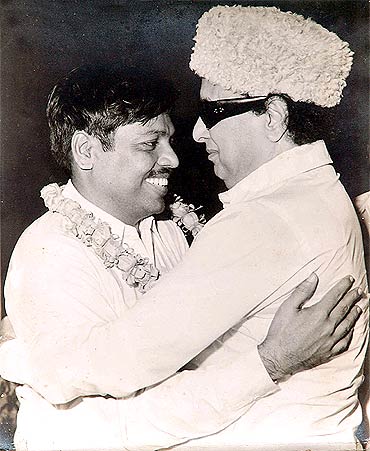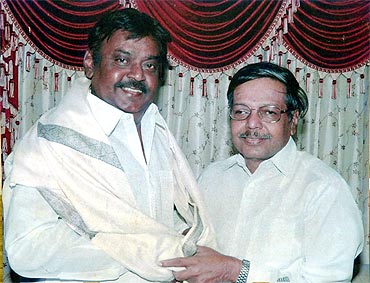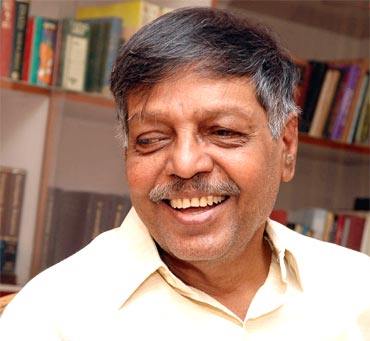Shobha Warrier
Panruti Ramachandran, 74, started his political career in 1956 as a member of the Dravida Munnetra Kazhagam under the leadership of party founder Annadurai. He started his political career as the secretary of the DMK association at the Annamalai University, where he was pursuing an engineering degree.
In 1966, he resigned from his job with the state electricity board to take up politics full time. In 1967, he was elected from Panruti constituency and from 1971, he served as the minister for state for transport in Karunanidhi's cabinet.
After his fall-out with Karunanidhi, Ramachandran joined the All India Anna Dravida Munnetra Kazhagam led by M G Ramachandran and served as the state minister for electricity. He was considered to be the closest confidant of MGR. In 1983, Ramachandran was sent to the United Nations by MGR to speak up for the cause of Sri Lankan Tamils. After MGR's death, he joined the Pattali Makkal Katchi.
Currently, he is the presidium chairman of the Desiya Murpokku Dravida Kazhagam. He was also instrumental in holding talks with the AIADMK to form an alliance to fight the ruling DMK-Congress combine in the state. After the AIADMK unilaterally announced a list of candidates, Ramachandran held marathon discussions with J Jayalalithaa's party and other allies in the coalition to prevent it from falling apart.
He has been elected to the state assembly six times from Panruti, but lost the election in 2006. In the forthcoming state polls, he is contesting from Alandur, a constituency that comes under Chennai.
In an interview with rediff.com's Shobha Warrier, he talks about the DMDK's poll plans, its alliance with the AIADMK and also the political future of his party.
What made the DMDK decide to go for an alliance? Does it have anything to do with the vote share in the assembly and Parliament elections, or the sentiments of cadres?
We started thinking about an alliance two years ago. It would not have mattered to us if all the political parties contested on their own. But major parties like the DMK and the AIADMK also formed alliances with other political parties. In such a situation, it is not good for us to go on our own. That was when we started thinking that it was better to form an alliance with political parties that had a similar ideology.
Two years ago, we also started preparing our cadres to think on those lines.
How was the response of the cadres? Earlier, they were told that your party would always contest alone.
Actually they wanted to join an alliance. In the last two elections, we fought on our own. Despite improving our vote percentage from 8.33 per cent to 10.6 per cent, the cadres felt that we would not taste victory in the present political atmosphere. They wanted a winning alliance.
Do you feel Tamil Nadu is also heading for coalition rule like the Centre and other states?
Although there have been pre-election alliances from 1967, it has been a single party rule in Tamil Nadu. The same thing will be repeated now.
Do you think this trend will continue?
That is what I feel. Even if the AIADMK-led alliance wins, we will not be partners in governing. That is the agreement we have with them.
If you cannot share power, what is the use of fighting an election in an alliance?
You can win seats in an alliance and then you can promote your ideas in public forums. That way, you create awareness among the people. It is actually political propaganda. When you cannot come to power on your own and when you share power with another political party, you will share its liabilities rather than its assets.
Unless you are a dominant partner in the government, you will not be able to implement your ideology. So, there is no point in asking for a share in the power when you are not able to dictate terms to the government.
'We had marathon consultations for each constituency'
Image: Ramachandran with DMDK chief VijayakanthHow long will you continue like this?
Till we strengthen our base. After all, we represent the youth of Tamil Nadu. Our party was formed in 2005. It will take some more time and we are prepared to wait till the time comes.
You are one of the persons instrumental in starting the DMDK. You have been a part of the DMK and the AIADMK. Was there any dilemma in the minds of all of you who decided to start the party about how different it was going to be from other Dravidian parties?
The DMK was founded by Anna (Annadurai). After Anna's death, Karunanidhi took over the reigns of the party and it ended in personal advancement of wealth and power. Then, the AIDMK was founded by MGR but after his death, it also went in a different direction.
So we thought there must be an alternative to both the DMK and the AIADMK. That is why we promoted DMDK solely on the ideology of elimination of poverty, equal opportunity to all etc. It is a broad-based new party, and we want to give a new politics to Tamil Nadu.
Is there space for a third front in Tamil Nadu?
At present, it (the current political situation) doesn't permit a third party alternative, unless there is a clean breakthrough like MGR achieved in his time. But that rarely happens.
When you decided to go for an alliance, did you send feelers to other parties or was it the other way around?
We are in the opposition camp since the inception of the party. We criticised the governments both at the Centre and the state. So the natural ally was the AIADMK.
Of course, the DMK also wanted us but having criticised the party all along, we could not have an alliance with them. We would have lost our credibility if we did so.
How did the alliance talks start?
Interestingly, it started at the grass-root level. It has to be that way because our own cadres and the AIADMK cadres had to fight together against the onslaught of the DMK.
They came together even before the leadership started talking. So, it was a natural alliance.
There were a lot of hiccups initially when the talks were going on. What were the problems?
The problems were at the middle level. We had to satisfy the party functionaries by offering them seats. There was a problem in sharing seats as the AIADMK wanted to come to power on its own and wanted more seats.
As we are the third major party in Tamil Nadu, we have to satisfy our people all over the state. So we wanted two seats for every parliamentary constituency. But there was already an alliance at the lowest level.
At the top level?
At the top level also, there was no problem between Jayalalitha and Vijayakanth. They are from the same field (cinema).
When the AIADMK released the first list, there was turmoil and there were talks about starting a Third Front. Were you really thinking of forming a Third Front?
See, when the AIADMK released the list even while parleys were going on between the alliance parties, we were all taken aback.
Later on, the AIADMK also realised that it should satisfy all the alliance partners.
Yes, there was a clamour for forming a Third Front but we were not interested in it. So we told the other parties to look before they leapt.
Did you feel a Third Front would be advantageous to the DMK?
Yes. We told the others that it would be advantageous to the DMK and the Congress, so we should not go for it.
After that, you personally spent hours discussing the seats
Yes, we had marathon consultations for each constituency. There were a lot of problems as the AIADMK had already fielded their candidates for some of the constituencies we wanted. So, they had to convince their people and then give us the seat. All this took a lot of time.
Were these the toughest negotiations you did in your career as a politician?
Yes. I had never entered into such long dialogues. We entered Jayalalitha's house at Poes Garden at 3.30 in the afternoon and left only by 5 the next morning. The previous day also, we were there from 7 pm to 3.30 am.
I think those marathon discussions were lengthier than the Camp David talks!
'Jayalalitha is generous, magnanimous and flexible'
Image: Panruti RamachandranPhotographs: Sreeram Selvaraj
Is AIADMK a very tough ally?
See, they had their problems. As they had already announced the names of candidates, they had to persuade those people to withdraw so that they could allot the seats to us. That is why it took so long.
The MDMK led by Vaiko has pulled out of the alliance. What kind of impact will it have on your chances?
It will have some impact. We didn't expect it to happen. Anyway the public trend is against the DMK regime in Tamil Nadu; perhaps the dissatisfaction of the MDMK will get submerged in the overall impact.
In their statement, the MDMK described Jayalalitha as an arrogant and egoistic ally. Is Jayalallitha an arrogant ally?
That is the usual epithet you use when you fall out.
How do you describe her?
She was generous, magnanimous and flexible as far as we were concerned.
What will be the major issue in the assembly elections?
Family rule, corruption, crime, incompetence, price rise, unemployment, etc. Dynastic politics is uppermost in the minds of all. Karunanidhi promoting his family is not liked even by DMK party members. But they cannot express it!
Will the 2G spectrum scam have an impact?
Yes, it will. The awareness (about 2G scam) has reached the nook and corner of Tamil Nadu. They now know that these people made a lot of money from the spectrum allocation. After all, the concerned minister (DMK leader and former telecom minister A Raja) is in jail.
Are you optimistic about the poll results?
I have been involved in politics since 1956. In my assessment, people have already come to a decision to overthrow this corrupt government. They only need a mechanism to get rid of the government and the mechanism is provided by this front. As we are all standing together, it is easy for the people to exercise their franchise.
Not only in the history of Tamil Nadu but also in India itself, corruption of such magnitude has not been seen before. Even the world is taken aback by the amount of loss incurred by the government of India. The greatest achievement by Karunanidhi is tarnishing the image of India all over the world.
What do you have to say about the freebies that are being offered by both the alliances? How sustainable are they?
As long as freebies are needed, we have to provide them. But our aim is to eliminate poverty to the extent that we don't need to give freebies. Freebies cannot be a permanent cure. What they need is education and employment. As long as they need it, this competition will continue.
Freebies are not the cure but only a pain killer!




article